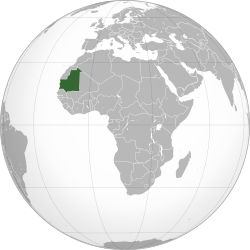LGBTQ rights in Mauritania | |
|---|---|
 | |
| Legal status | Illegal since 1983: Islamic law (Sharia) is applied [1] |
| Penalty | De jure: Capital punishment for men, (not enforced; [2] under moratorium); up to 2 years in prison and a fine for women. De facto: Up to 2 years in prison and a fine for both men and women. |
| Gender identity | No |
| Military | No |
| Discrimination protections | None |
| Family rights | |
| Recognition of relationships | No recognition of same-sex relationships |
| Adoption | No |
Lesbian, gay, bisexual, transgender, and queer (LGBTQ) people in Mauritania face severe legal challenges not experienced by non-LGBTQ residents. Both male and female kinds of same-sex sexual activity are illegal in Mauritania. Openly homosexual Muslim men face stoning to death, though there have been no known cases of executions caused by homosexuality charges in the country; whereas women who have sex with women face prison. [3]